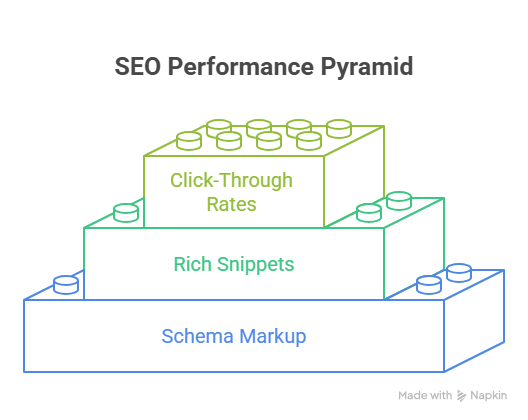Did you know that proper schema markup implementation can increase your website’s visibility in search engine results by up to 30%? Schema markup is a crucial aspect of search engine optimization (SEO) that helps search engines understand your website’s content.
However, implementing schema markup correctly can be a challenge. That’s where a structured data testing tool comes in handy. It ensures that your schema markup is error-free and provides valuable insights into how search engines interpret your website’s content.
In this article, we will guide you through the process of testing your schema markup correctly, highlighting the importance of using a structured data testing tool to optimize your website’s SEO.
Understanding Schema Markup and Structured Data
Understanding schema markup and structured data is vital for improving your website’s SEO performance. Schema markup is a form of microdata that helps search engines like Google, Bing, and Yahoo understand the content and context of your webpage.
What is Schema Markup and Why It Matters
Schema markup is a semantic vocabulary of tags (or microdata) that you can add to your HTML to improve the way search engines read and represent your page in search results. It’s a crucial element for enhancing your website’s visibility and driving more qualified traffic to your site. By using schema markup, you can help search engines provide more informative results for users, which can lead to higher click-through rates.
Common Types of Schema for Different Websites
There are various types of schema markup that cater to different types of websites. For instance, LocalBusiness schema is ideal for businesses with a physical location, while Product schema is suitable for e-commerce sites. Other common types include Review schema and Event schema. Using the right type of schema markup can help your website’s content get featured in rich snippets, thereby improving its visibility.

How Structured Data Improves SEO Performance
Structured data, facilitated by schema markup, improves SEO performance by making it easier for search engines to understand your content. This can lead to enhanced search engine results, including rich snippets, which can significantly boost your website’s click-through rates. Key benefits include:
- Increased visibility in search results
- Improved click-through rates
- Better representation of your content

Using tools like the rich snippets tool and schema markup validator can help you test and refine your schema markup, ensuring it is correctly implemented and effective.
Using Structured Data Testing Tools Effectively
To ensure your schema markup is correct, it’s crucial to use structured data testing tools effectively. These tools help you validate your schema markup and identify any errors or areas for improvement.
Google’s Rich Results Test: Step-by-Step Guide
Google’s Rich Results Test is a powerful tool for testing your schema markup. To use it effectively, follow these steps:
- Go to the Google Rich Results Test page.
- Enter the URL of the page you want to test or copy and paste the HTML code.
- Click “Test URL” or “Test Code” to run the test.
- Review the results to identify any errors or warnings.
Schema.org Validator and JSON-LD Testing Tools
In addition to Google’s Rich Results Test, you can use the Schema.org Validator and JSON-LD testing tools to validate your schema markup. These tools help ensure that your schema markup is accurate and compliant with schema.org standards.
How to Interpret Test Results and Fix Common Errors
When interpreting test results, look for errors or warnings related to your schema markup. Common errors include missing or incorrect properties, invalid syntax, and incorrect data types. To fix these errors, review your schema markup code, make the necessary corrections, and retest using the structured data testing tools.
Key actions to fix common errors:
- Review and correct your schema markup code.
- Check for missing or incorrect properties.
- Validate your syntax and data types.
Effective Schema Markup Testing for Better SEO
Testing schema markup is crucial for ensuring that your website’s structured data is correctly interpreted by search engines. By using tools like Google’s Rich Results Test and a json-ld testing tool, you can validate your schema markup and identify potential errors.
A structured data validator helps you verify that your schema markup is correctly implemented, which is essential for improving your website’s SEO performance. By regularly testing and refining your schema markup, you can enhance your website’s visibility in search engine results.
By applying the knowledge gained from this article, you can improve your website’s search engine ranking and drive more traffic to your site. Start testing your schema markup today using a structured data validator and json-ld testing tool to optimize your website’s SEO performance.
FAQ
What is the purpose of testing schema markup?
Testing schema markup ensures that it is implemented correctly, allowing search engines to understand the content and context of your website, which can improve its visibility in search engine results.
What are the best tools for testing schema markup?
Some of the most effective tools for testing schema markup include Google’s Rich Results Test, Schema.org Validator, JSON-LD testing tools, and the Structured Data Testing Tool.
How do I use Google’s Rich Results Test to validate my schema markup?
To use Google’s Rich Results Test, simply enter the URL of the page you want to test, and the tool will analyze the schema markup and provide feedback on any errors or warnings.
What is the difference between schema markup and structured data?
Schema markup is a specific type of structured data that is used to provide additional context to search engines about the content on a webpage, while structured data is a broader term that encompasses any data that is organized in a way that makes it easily machine-readable.
Can I test schema markup on a local development site?
Yes, you can test schema markup on a local development site using tools like the Schema.org Validator or JSON-LD testing tools, which do not require a live URL to function.
How often should I test my schema markup?
It’s a good idea to test your schema markup regularly, especially after making changes to your website’s content or schema markup, to ensure that it remains valid and effective.
What are some common errors that can occur when implementing schema markup?
Common errors include incorrect or missing required properties, invalid or inconsistent data types, and incorrect nesting of schema markup elements, which can be identified and fixed using structured data testing tools.

